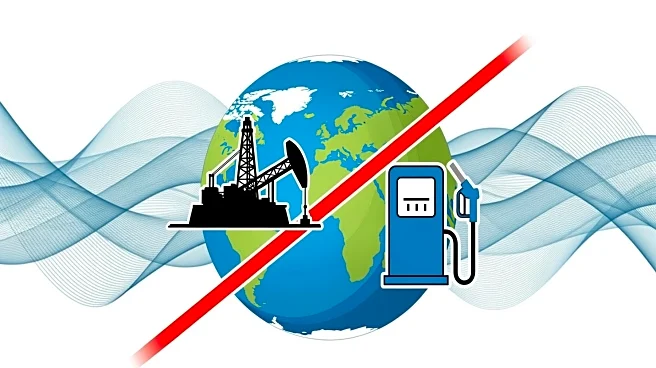What's Happening?
A coalition of over 20 nations supporting Ukraine has pledged to remove Russian oil and gas from the global market as a strategy to pressure President Vladimir Putin to end the ongoing war. This commitment
was announced during a summit in London, hosted by UK Prime Minister Sir Keir Starmer. The UK and the US have recently imposed sanctions on Russia's largest oil companies, while the European Union has targeted Moscow's liquefied natural gas exports. Ukrainian President Volodymyr Zelensky, present at the summit, emphasized that increasing pressure on Russia is crucial to halting the conflict. Despite these efforts, no new long-range missile deliveries to Ukraine were announced, a point of contention for Zelensky, who believes such weapons could significantly impact the war by targeting key Russian military sites.
Why It's Important?
The decision to target Russian oil and gas exports is significant as it aims to cut off a major source of funding for Russia's military operations. This move could have substantial economic implications, potentially leading to increased energy prices globally and affecting countries dependent on Russian energy supplies. For Ukraine, the support from its allies is crucial in maintaining its defense capabilities and resilience against Russian aggression. However, the lack of concrete military support, such as long-range missiles, may limit Ukraine's ability to change the dynamics on the battlefield. The ongoing conflict continues to strain Ukraine's infrastructure, with frequent power outages and water supply issues affecting daily life.
What's Next?
The coalition's commitment to removing Russian oil and gas from the market is expected to continue, with further sanctions and economic measures likely to be discussed. The EU leaders have agreed to support Ukraine's financial needs for the next two years, although the use of frozen Russian assets remains undecided. The coalition also plans to enhance Ukraine's air defenses in response to persistent Russian air assaults. As winter approaches, the humanitarian situation in Ukraine could worsen, prompting further international aid and support. The effectiveness of these measures in compelling Russia to negotiate remains uncertain, with ongoing discussions among Ukraine's allies on how to increase pressure on Moscow.









